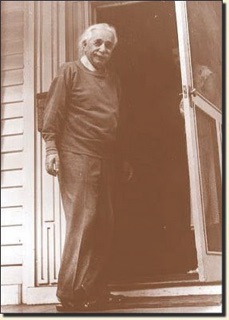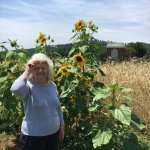 By Carole Hemingway ⼁Submitted Photos
By Carole Hemingway ⼁Submitted Photos
I first met “Uncle Al” during the cozy autumn months, when I was still in grade
school. I adored my teachers, and they liked me, especially my science teacher, who was German and looked like Eleanor Roosevelt. To me, Mrs. Strein embodied a goddess, the woman I looked up to, who educated me in the field of science. She had polio, and walked with a cane. The other kids made fun of her constant limp, but I often stayed after school and washed the blackboards. Mrs. Strein had a unique way of teaching science, it was like storytelling. She made it interesting.
One day, as I was about to walk home, she offered me a ride.
On our drive through a backdrop of autumn colors she asked me if I’d like to go and meet a dear friend of hers whom she called her ‘political soul mate.’ She said my mother would have to sign a permission slip; Mom trusted Mrs. Strein above all, and consented. So on a beautiful Saturday morning we pulled up to 112 Mercer Street in Princeton, New Jersey. Suddenly, when the car stopped I had a queasy nervous stomach. His house was a world-famous landmark because it symbolized the man who lived there. The man with wild white bushy hair, who wore no socks greeted us outside his door as we walked up the steps littered with pumpkins which were on the left of the stairs. The air was crisp…and Albert Einstein lived in an unassuming house, unpretentious, and charming like its owner. The house sat on the main street, highly visible yet protected by deep, dark shrubbery; furnished in heavy German-style.
When Mrs. Strein introduced us, he took my hand and kissed it. I knew I was never going to be the same. I sat in a corner on a leather couch by the fireplace playing with one of his cats, when he came over and knelt beside me.
“Child, come and join us in conversation,” to which I replied, “I’m a kid; what could I possibly have in common with you?” He answered, “Can you swim?” to which I replied, “No.” He said, “Neither can I. Let’s talk; I’m sure we will find other common ground.”
I remembered afternoons sailing in his ‘leaky boat’ and we bailed out a lot of water. His housekeeper and secretary would come out on the lawn screaming in German because neither of us wore life preservers, our code and proof of bravery. Since he didn’t drive, we walked everywhere. He used to help me with my math homework. I was terrible at it. I wanted to be a writer, so I had no interest in math.
He loved wearing old sweatshirts, baggy pants, and no socks even in the dead of winter. He found that real power was in knowledge and that power without wisdom was deadly. He was passionately curious and asked what would it be like, did I think, to race alongside a light beam? At my age then, I was struggling with a dysfunctional family and never thought of such things. He felt that freedom was the lifeblood of creativity and that without it man could not write what he was feeling. Later in life, I learned from my dad that creativity required being willing not to conform to anyone’s standards of excellence, except your own.
Life’s mysteries were Einstein’s playground and he invited me into his world. I was fascinated and never bored. On love, he said one day, “something feels right, or it doesn’t, child, and believe me you’ll know the difference.”
He was easily moved by other’s pain. I watched him deliver a litter of kittens to a very pregnant mother cat that otherwise would have died. He was a gentle man, a kind man, and he allowed me to call him affectionately, “Uncle Al.” I simply loved him. He sympathized with the misfits of society, his patience unending.
As he neared the end of his life, I was sitting with him on a park bench and asked if he regretted anything in his life. He puffed on his pipe, suddenly grew sad with wrinkled brow and answered: “The only regret I have, Carole, was signing a letter to President Roosevelt recommending that atomic bombs be made.” He saw the startled look on my young face, put his arm around my shoulders, looked into my eyes and said, “America is an adolescent country and Americans will never learn how to use POWER properly.”
 Carole Hemingway is an internationally regarded author, speaker, and historical researcher. She currently lives along the coast of Maine where she is writing a book about Gettysburg and waiting to publish another book about her father, Ernest.
Carole Hemingway is an internationally regarded author, speaker, and historical researcher. She currently lives along the coast of Maine where she is writing a book about Gettysburg and waiting to publish another book about her father, Ernest.
